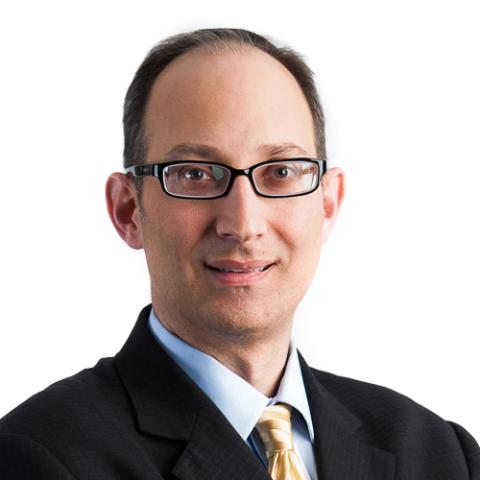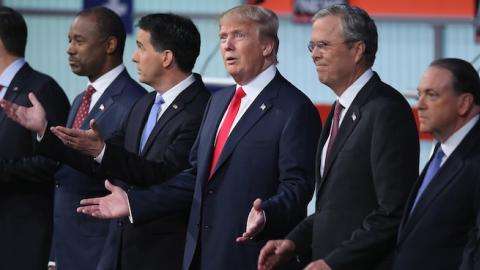Most of our Founding Fathers were serious readers, which is one reason we have a free and prosperous nation built on a foundation of the rule of law. John Adams, Thomas Jefferson, and James Madison were all deeply influenced by the books they read. And they were part of a generation that read widely and voraciously. In subsequent years, some of our greatest presidents, both Democrat and Republicans, were avid readers – including Abraham Lincoln, Teddy Roosevelt, and Harry Truman.
Given this history, it is worth looking at what the public record tells about what the 10 GOP presidential candidates from the first presidential debate are reading. While reading does not necessarily make one a great president, it is an important tool for measuring a president’s knowledge base and provides helpful insight into a candidate’s beliefs and worldview.
The 2016 hopeful getting the most attention these days is Donald Trump. As with everything he does, Mr. Trump is prolific. This extends to interactions with the written word as well. He is, for starters, an active book recommender. In one instance, he provided a list of twenty recommended books on just China alone. One of them, unsurprisingly, was by GOP foreign policy titan Henry Kissinger, but there were also titles by Simon Winchester and Amy Chua – Battle Hymn of the Tiger Mother. Beyond China, Trump likes reading about Abraham Lincoln, telling MSNBC’s Morning Joe that, "I will read anything about Lincoln. I just found the whole era fabulous. I studied it and I like it.” In addition to these favored topics, Trump has also listed a favorite book: The Power of Positive Thinking, by Norman Vincent Peale.
Mr. Trump is not only a book recommender, but an author as well. His website lists no fewer than 15 books he has authored, including Trump: The Art of the Deal, Trump: Surviving at the Top, and Time to Get Tough: Making America #1 Again. The Washington Post's Carlos Lozada binge-read 8 of Trump’s books and determined that “Trump’s world is binary, divided into class acts and total losers.” Anyone watching his campaign pronouncements would make a similar conclusion. Trump also likes leadership books and in yet another Trump book, Trump 101, he recommended Sun Tzu’s The Art of War, Lee Iacocca’s Iacocca, and Machiavelli’s The Prince. Interestingly, were Trump to become president, on day one he would be in third place on the list of most prolific authors who served as president, behind only Jimmy Carter and Teddy Roosevelt.
One of the biggest readers in the GOP field is Jeb Bush. His brother George W., for all of the jibes about his anti-intellectualism, was also an active reader, consuming between 60 and 90 books a year during his presidency. We don’t know how many books Jeb reads, but we do know he reads a lot, as he is often citing books he read and even making policy arguments based on his reading from the stump. One recent Jeb read is AEI president Arthur Brooks’ new book, The Conservative Heart, which tells conservatives how they can best communicate sympathy for the average voter, something Jeb’s dad George H.W. Bush had trouble with in 1992. (Recall Bush 41’s infamous talking point with the words, “Message: I care,” which he read aloud.) The Brooks selection is somewhat typical for Jeb, as there is a bit of the conservative nerd tinge to Bush’s reading. In the recent past, Bush has also cited Charles Murray’s Coming Apart – “a very tough book,” he called it – Robert Kagan’s The World America Made, George Gilder’s Knowledge and Power, Philip K. Howard’s The Rule of Nobody, Virginia Postrel’s The Future and Its Enemies, Marvin Olasky’s The Tragedy of American Compassion, and Killing Jesus, by Bill O’Reilly and Martin Dugard. According to the Observer, when author Dan Senor gave Mr. Bush a copy of Bret Stephens’ America in Retreat to read, Bush’s response was, “Oh, I’ve already read this book.”
Mr. Bush also has a soft spot for mainstream best-sellers, such as Robert Putnam’s Our Kids and Erik Larson’s Devil in the White City. When asked about these works, he remembered the authors but not the titles, understandable when one has 25 titles on his Kindle at any one time. As the former governor of Florida, Mr. Bush also has a pair of favorite Florida writers, the novelists Brad Meltzer and Dave Barry. Bush does not just do books, he also likes wonky conservative magazines, such as the American Spectator and the now departed Policy Review.
Threatening Mr. Bush on the wonky conservative front – as well as among Florida voters – is his fellow Floridian Marco Rubio. Rubio seems partial to the work of Yuval Levin – who edits the policy-heavy journal National Affairs – and the so-called “Reformicons,” conservatives who are trying to update the conservative message with policies that appeal to 21st century voters. Mr. Rubio has specifically cited the Reformicon anthology Room to Grow: Conservative Reforms for a Limited Government and a Thriving Middle Class, as a book that he has “admired and borrowed liberally” from. In a similar vein, Mr. Rubio has also cited the work of AEI’s Brooks, and his concept of “earned success,” the idea that people derive less happiness from unearned recompense. In Room to Grow, Mr. Rubio lists no fewer than 45 policy thinkers whose writings have influenced his approach.
Another candidate who likes policy books is Rand Paul, but his preferences have more of a libertarian flavor, while Jeb and Marco are more in the camp of full-spectrum conservatism. Mr. Paul leans toward more bracing critics of the State. His Senate website used to have a reading list for students, which included Friedrich A. Hayek’s The Road to Serfdom, Ayn Rand’s Atlas Shrugged, and Ludwig von Mises’ Human Action, as well as a number of works by his father, former Congressman and presidential candidate Ron Paul. Of those, he quoted Hayek from the Senate floor during his March 2013 filibuster on American drone policy. Mr. Paul has also referred to the libertarian thinker Murray Rothbard as “a great influence on my thinking” as a young man. There is some indication that Mr. Paul is backing away from the pure libertarian profile. For a 2014 New Yorker profile, he was dismissive of his attachment to some of the iconic libertarian authors. Responding to Ryan Lizza’s queries about Rand, Hayek and Rothbard, he said, respectively, “she’s one of many authors I’ve read. I like Barbara Kingsolver, too”; “Hayek? I wouldn’t say I’m like some great Hayek scholar”; and Rothbard? “There are many people I’m sure who are more schooled.’” Perhaps, but there are many less schooled in Rothbard as well, especially among his 2016 rivals.
Like Mr. Paul, Ted Cruz is another Senator and 2016 candidate who has mentioned books during a Senate filibuster. Mr. Cruz’s recitation of Dr. Seuss’ Green Eggs and Ham may be the most famous book reference incident of all of the 2016 candidates to date, but it would be unfair to limit a review of Mr. Cruz’s reading to that one book. He also recited an amended version of Cicero’s Catiline oration, demonstrating at least some knowledge of the classics. As those who follow his campaign know, Mr. Cruz may be the most likely of the 2016 candidates to make a pop culture reference – TheSimpsons is a particular favorite – but he recently shared some book recommendations with the New York Times. Mr. Cruz told the Times that he, too, has read Brooks, making the AEI president the most cited contemporary author by the 2016 GOP field. There seemed to be a strategic purpose to some of Cruz’s other book plugs. He mentioned Mark Levin’s Plunder and Deceit, as well as Lawrence Wright’s The Looming Tower. Mr. Levin is, of course, an important conservative radio host, and Mr. Wright’s book is a frequent recommendation of conservative radio host Hugh Hewitt, who will also be asking questions at the upcoming CNN GOP debate. Getting on both of their good sides is generally a wise move.
One candidate who himself was a conservative talk show host is Mike Huckabee. Mr. Huckabee, a former pastor, has recommended books by Christian theologians such as C.S. Lewis (The Problem of Pain), Francis Schaeffer (Whatever Happened to the Human Race?) and Dietrich Bonhoeffer (The Cost of Discipleship). He also recommended Dale Carnegie’s How to Win Friends and Influence People as well as How Democracies Perish, by Jean-François Revel.
Mr. Huckabee is not the only candidate with a yen for religious books. Wisconsin Governor Scott Walker recently referred to Sarah Young’s Jesus Calling: Enjoying Peace in His Presence at a gathering of Christians in Iowa. Following Mr. Walker’s plug, the author benefited from healthy sales increases on a number of online book tracking sites. There is a long tradition of presidential reading selections leading to increased sales of the work in question. Mr. Walker belongs to a smaller club: causing a presidential candidate book bump. In addition to religious works, Mr. Walker, as a sitting governor, has been boning up on foreign policy, and has read Henry Kissinger’s World Order, as well as the 9/11 Report.
Sharing Mr. Walker’s interests in both Christianity and foreign policy is Ohio Gov. John Kasich. When Mr. Kasich was criticized by some conservatives about his acceptance of the Obama administration’s Medicaid expansion, he referred to the guidance he has received from the “Good Book,” i.e., The Bible. He has also read Nathan Sharansky’s Fear No Evil, about Sharansky’s experiences in a Soviet prison.
Another governor getting up to speed on foreign policy is Chris Christie. Mr. Christie has met with Kissinger, of course, and read Ken Adelman’s Reagan at Reykjavik, about Reagan’s arms talks with Soviet leader Mikhail Gorbachev. He has also revealed his favorite book: F. Scott Fitzgerald’s The Great Gatsby, which he has read twice. Finally, Mr. Christie has had well-documented struggles with his weight, and has subsequently been given a barrage of diet books as gifts.
Perhaps the most moving experience of all the candidates when it comes to books is that of Dr. Ben Carson. In an interview on Fox News Sunday, Mr. Carson spoke of the importance of reading to him as a child, noting that his poor family “Never had money for anything” but they did have books. Mr. Carson’s mother Sonya, who had only a third grade education, would make young Ben read two library books a week and write reports on them. The books expanded his world. As Mr. Carson described it, “Between the covers of those books I could go anyplace, I could be anybody, I could do anything.” The reading he did as a child had a great influence on his subsequent endeavors. As he put it in the interview, as a result of his reading “about people of great accomplishment, I began to realize that the person who has the most to do what happens to you in life is you. Not somebody else and not the environment.” When it comes to insights based on a candidate’s reading, it’s hard to beat the Ben Carson story. His life, most of all, shows the power of books – whether or not he ever becomes president.



















